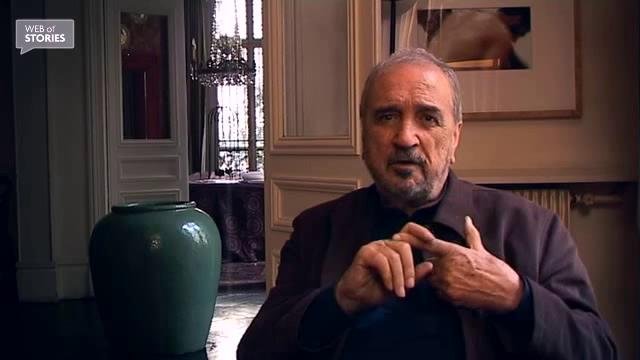NEXT STORY

My first real book
RELATED STORIES

NEXT STORY

My first real book
RELATED STORIES


|
Views | Duration | |
|---|---|---|---|
| 1. A house with a history | 1 | 988 | 01:13 |
| 2. My rural roots | 291 | 02:07 | |
| 3. My birthday tree | 2 | 242 | 00:58 |
| 4. Books of my childhood | 262 | 01:35 | |
| 5. Pictures that shaped my image of the world | 258 | 01:37 | |
| 6. First films | 219 | 02:12 | |
| 7. My first real book | 196 | 00:43 | |
| 8. Nurturing my flair for learning | 178 | 01:45 | |
| 9. Growing up in the country | 137 | 01:31 | |
| 10. An inspirational history teacher | 1 | 150 | 03:52 |

I had never been in a cinema before the age of eight or nine, and it was to see one or two French films of the time, so nothing exotic. The first films as such, I watched - I was 11 or 12 - I was in a Catholic boarding school during the war near my village, and they were German films, as American films were forbidden. The first ones I've ever watched were the Nibelungen, by Fritz Lang, and M... not M... Eine Stadt sucht einen Mörder, because that one we did not see, but M for Metropolis. Yes, Metropolis, I even watched it twice, it had such an impact, its images will stay with me for the rest of my life, I watched it again much later and even some of its lines... it was subtitled as it was a silent film... and two things in Metropolis struck me: first, I didn't know what a town was. You need to try to understand what a little farmer boy born in a small village... the town was for him something out of a legend, something mythical which is out of reach. So the first city I ever saw was on screen in Metropolis. It is a subterranean city, dark, dangerous, where chained slaves work nights and days, a city which can be flooded, destroyed by some cataclysm. And the second image, is that of a woman. For a countryside boy and even for a city one, 'the woman', especially without any illustrations as it was then, is a mystery. What is she made of? How is she made? How is she different from us? Those were questions without any answers. Therefore, that idea that the woman, in Metropolis, hides something that's extremely dangerous and made of metal under a layer of flesh, that idea followed me for a long time, and I kept wondering if women, like Brigitte Helm in Metropolis, didn't have something metallic under their human skin.
Je ne suis pas allé au cinéma avant d’avoir huit ou neuf ans, encore était-ce pour voir un ou deux films français de l’époque donc rien d’exotique. Les premiers films sérieux que j’ai vu, j’avais déjà 11 ou 12 ans, j’étais dans une pension catholique pendant la guerre, tout près de mon village, et c’était des films allemands car les films américains étaient interdits. Et les premières films que j’ai vu étaient Les Nibelungen de Fritz Lang et M …non pas M le maudit, celui-là on l’a pas vu… mais M de Metropolis. Oui, Metropolis je l’ai même vu deux fois, c’est un film qui m’a énormément impressionné dont les images se sont vraiment gravées en moi pour toute ma vie, je l’ai revu longtemps après… et même des phrases du film qui étaient en sous-titres, c’est un film muet… et en particulier deux faits m’ont marqué dans Metropolis: d’abord je ne savais pas ce qu’était une ville. Il faut essayer de comprendre ce qu’un petit paysan né dans un petit village… la ville pour lui c’était quelque chose de légendaire, de mythique… à quoi il n’a pas accès. Donc la première ville que j’ai vu c’était dans Metropolis au cinéma. C’est une ville souterraine, obscure, dangereuse, où des esclaves enchaînés travaillent le jour et la nuit et qui peut être inondée, détruite par un cataclysme. Et la seconde image c’est celle de la femme. Pour un enfant de la campagne et pour un enfant de la ville aussi, la femme, surtout sans image à l’époque, est un mystère. De quoi une femme est-elle faite ? Et comment est-elle faite ? En quoi est-elle différente de nous ? C’étaient des questions sans réponse. Donc, cette idée que la femme de Metropolis sous sa chair cache une enveloppe métallique extrêmement dangereuse, cette idée m’a suivi pendant longtemps et je me suis demandé si toutes les femmes n’avaient pas, comme Brigitte Helm dans Metropolis, quelque chose de métallique en dessous de cette chair humaine apparente.
French screenwriter Jean-Claude Carrière (1931-2021) began his association with films aged 24 when he was selected by Jacques Tati to write for him. This early experience led to further contact with other film-makers, including Luis Buñuel with whom Carrière collaborated for many years. He wrote screenplays for films including Belle de Jour, The Discreet Charms of the Bourgeoisie, Tin Drum and Danton.
Title: First films
Listeners: Andrzej Wolski
Film director and documentary maker, Andrzej Wolski has made around 40 films since 1982 for French television, the BBC, TVP and other TV networks. He specializes in portraits and in historical films. Films that he has directed or written the screenplay for include Kultura, which he co-directed with Agnieszka Holland, and KOR which presents the history of the Worker’s Defence Committee as told by its members. Andrzej Wolski has received many awards for his work, including the UNESCO Grand Prix at the Festival du Film d’Art.
Tags: Nibelungen, Metropolis, Fritz Lang
Duration: 2 minutes, 12 seconds
Date story recorded: January 2010
Date story went live: 26 July 2010